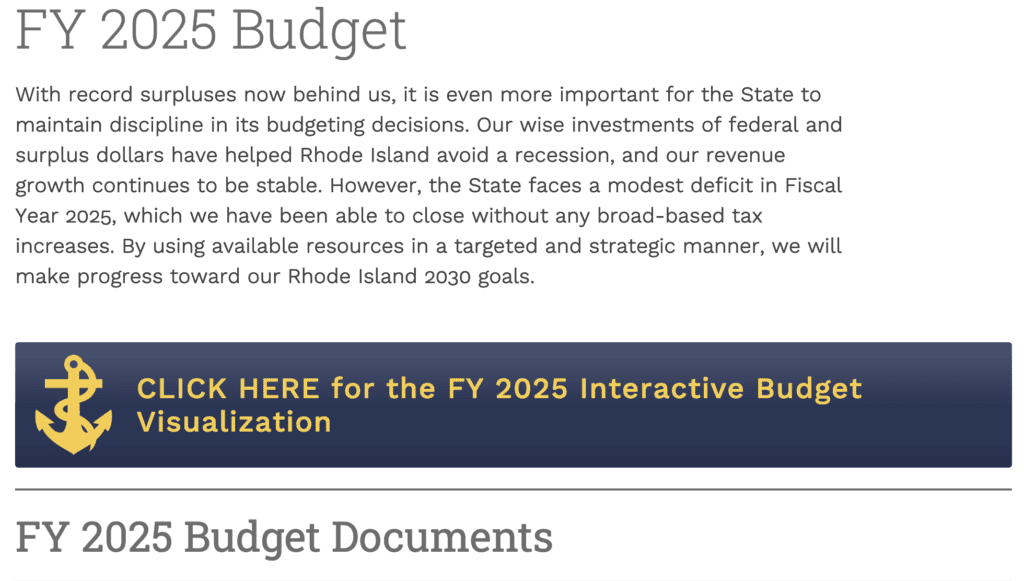Search Posts
Recent Posts
- Rhode Island Weather for May 22, 2025 – Jack Donnelly May 22, 2025
- We Cook! Mill’s Tavern Louisiana style beer braised Short Rib, Grits, Baked Beans, Cornbread May 22, 2025
- RI Veterans: Did you know? 22.05.25 (Medical, Memorial Day, War Dog, events) – John A. Cianci May 22, 2025
- RI Trucking Association calling on Governor and General Assembly to halt truck tolls May 22, 2025
- 8th annual Rhode Island Slow Pitch Softball Hall of Fame: Class of 2025 May 22, 2025
Categories
Subscribe!
Thanks for subscribing! Please check your email for further instructions.

Governor’s proposed FY 2025 Rhode Island budget
Photo: Cover of Governor’s proposed budget
Governor Dan McKee submitted his FY 2025 “Team Rhode Island” budget to the General Assembly. The budget makes key investments in education, small businesses, and Rhode Island’s health care system without raising any broad-based taxes. The budget also maintains the fiscal discipline that Rhode Island has had over the past two years – using one-time funds for one-time investments.
“The Team Rhode Island budget that I’m sending to the General Assembly today prioritizes programs and initiatives that will help raise the incomes of our fellow Rhode Islanders,” said Governor Dan McKee. “By using available resources in a targeted and strategic manner, we will continue to make progress on our RI 2030 goals while putting Rhode Islanders to work in good-paying jobs on projects that will pay dividends for decades to come.”
The Governor proposes key investments in Pre-K through 12 education to ensure Rhode Island’s children can reach their fullest potential; Medicaid rates and healthcare facilities to help Rhode Islanders have better health outcomes; and initiatives to raise incomes and help small businesses thrive.
Among the investments in the Governor’s budget proposal are:
Education
- Raising the additional amount of per-pupil funding for Multilingual Learners in the three lowest proficiency categories from 15% to 25% of the per-pupil amount. More support for this student population is important to accelerate gains in English proficiency.
- Investing $15.0 million to improve outcomes in math and English language arts by providing coaching services to local education agencies with the most acute academic needs, as well as professional development opportunities for teachers and funds to meet the needs of students, families, and teachers.
- Adding 35 Pre-K classrooms totaling 700 seats for the start of the 2024-25 school year. This will bring the total number of Pre-K seats to 3,000 – a pivotal step in achieving the State’s goal of offering 5,000 seats by 2028.
- Transitioning roughly 6,500 students in Rhode Island public, charter, and state schools from being eligible for reduced-price breakfast and lunch to receiving both meals at no cost to their families.
- Providing $5.0 million to support high-quality, out-of-school-time programming, with an emphasis on critical skill development.
- Increasing state funding formula aid by $19.2 million, which raises per-pupil funding to $12,335 – an increase of $459 from the enacted FY 2024 level.
Health and Human Services
- Investing $20.4 million in general revenue ($51.2 million, all funds) to phase in new Medicaid rates that were proposed as part of the Office of the Health Insurance Commissioner’s rate review process in 2023. The Governor proposes phasing in these higher rates over three years for all services except for Early Intervention.
- Fully funding the rate increase for Early Intervention in FY 2025 with $1.7 million in general revenue ($3.8 million, all funds). This represents further support for a program that promotes the development of infants and toddlers who have a developmental disability or delay.
- Providing $29.1 million in general revenue ($79.7 million, all funds) to establish rates and support operating costs for Certified Community Behavioral Health Clinics – a new model of care to provide a comprehensive range of behavioral health services to improve outcomes and reduce reliance on emergency departments.
- Providing additional state-directed payments to hospitals with approximately $90 million in general revenue and $284 million from all funding sources to improve quality and create better rate parity between commercial health insurance and Medicaid rates. These payments, which were approved in the enacted FY 2024 budget, will reduce the gap between rates and provide hospitals with additional financial support.
- Launching a new Summer Electronic Benefit Transfer program to ensure children have access to nutritious meals during the summer months when school is out of session.
- Supporting nursing homes with $10.0 million in State Fiscal Recovery Funds to bridge the gap from July to October when new rates along with an annual inflationary index take effect.
Raising Incomes, Small Business, and the Economy
- Raising the exemption for taxable retirement income from $20,000 to $50,000 staring in tax year 2025 – projected to save Rhode Islanders $3.0 million in FY25 and $6.2 million in FY26.
- Cutting the corporate minimum tax from $400 to $350, which is expected to benefit approximately 65,000 entities.
- Eliminating various nuisance fees to help households and small businesses.
- Building on prior investments to advertise Rhode Island as a destination for tourism and business travel with an additional $1.4 million.
- Investing $0.5 million to expand efforts to register minority and women business enterprises to maximize their participation in state procurements.
- Providing $1.0 million in grants to municipalities and economic development agencies to revitalize main streets and business districts.
General Obligation Bonds
- The Governor also recommends placing four general obligation bond questions – totaling $345.0 million – on the November ballot to make long-term, infrastructure improvements for higher education, housing, a state archive facility, and the environment.
Higher Education Facilities – $135.0 million
- University of Rhode Island (URI) Biomedical Sciences Building: Providing $80.0 million to help build a facility on the Kingston Campus that will include the laboratory space necessary to advance cutting-edge discovery, educate tomorrow’s workforce, and accelerate the life sciences industry. The project builds on the creation of the State’s Life Sciences Hub that will fund and incubate Rhode Island-based life sciences companies that promote economic and workforce development and position Rhode Island to compete nationally and internationally.
- Rhode Island College (RIC) Cybersecurity Building: Providing $55.0 million to repair and restore Whipple Hall to support the Institute for Cybersecurity and Emerging Technologies that is preparing students and professionals with the technical and business skills associated with cybersecurity, artificial intelligence, and other emerging technologies.
Housing and Community Opportunity – $100.0 million
- Increasing affordable and middle-income housing production and infrastructure, supporting community revitalization, and promoting home ownership.
State Archive and History Center – $60.0 million
- Establishing a modern, permanent state archive and history center to store and display historical documents central to both the state’s and country’s founding, including copies of the Declaration of Independence, letters from George Washington, and the original Public Laws and Private Acts of the General Assembly.
Green Economy – $50.0 million
- Port of Davisville Infrastructure at Quonset: Providing $20.0 million to make infrastructure improvements at the port that are part of its master plan, including the development of roads for oversize freight vehicles to access a new terminal and the completion of space for cargo to be offloaded. These projects are upgrading World War II-era infrastructure and positioning the port to accommodate offshore wind project components and logistics staging.
- Municipal Resiliency: Providing $10.0 million in financial assistance to municipalities to restore or improve the resiliency of infrastructure, vulnerable coastal habitats, and rivers and stream floodplains. These funds are expected to leverage significant matching funds to support local programs to improve community resiliency and public safety in the face of increased flooding, major storm events, and environmental degradation.
- Newport Cliff Walk: Providing $8.0 million to restore or improve the resiliency of the historic tourism infrastructure of the Newport Cliff Walk.
- Brownfields Remediation and Economic Development: Providing $5.0 million for up to 80 percent matching grants to public, private, and nonprofit entities for brownfield remediation projects.
- Local Recreation Projects: Providing $5.0 million for up to 80 percent matching grants for municipalities to acquire, develop, or rehabilitate local recreational facilities to meet the growing needs for outdoor recreational facilities.
- Coastal Resiliency and Public Access Projects: Providing $2.0 million for up to 75 percent matching grants to public and nonprofit entities to restore or improve the resiliency of vulnerable coastal habitats and restore rivers and stream floodplains. These funds are expected to leverage significant matching funds to support local programs to improve community resiliency and public safety in the face of increased flooding, major storm events, and environmental degradation.
The Budget is posted on the state’s website, complete with drop downs and summary presentations:

View Governor McKee’s full budget submission here.
_
